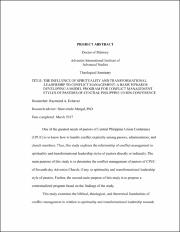| dc.contributor.author | Echavez, Raymond A. | |
| dc.date.accessioned | 2020-11-05T01:17:37Z | |
| dc.date.available | 2020-11-05T01:17:37Z | |
| dc.date.issued | 2017-03 | |
| dc.identifier.uri | https://dspace.aiias.edu/xmlui/handle/20.500.12977/162 | |
| dc.description | Unpublished Project (DMin)
Shelf Location: BV4597.53.C58 .E33 2018 ATDC | en_US |
| dc.description.abstract | One of the greatest needs of pastors of Central Philippine Union Conference (CPUC) is to know how to handle conflict explicitly among pastors, administrators, and church members. Thus, this study explores the relationship of conflict management to spirituality and transformational leadership styles of pastors directly or indirectly. The main purpose of this study is to determine the conflict management of pastors of CPUC of Seventh-day Adventist Church, if any, to spirituality and transformational leadership style of pastors. Further, the second main purpose of this study is to propose a contextualized program based on the findings of the study.
This study examines the biblical, theological, and theoretical foundations of conflict management in relation to spirituality and transformational leadership towards
developing a model program for conflict management among pastors of CPUC. This study describes how the program is designed and how it is implemented based on the context. Although most pastors of CPUC sympathize with how to resolve conflict among them, they simply do not have the privilege and opportunities to participate in any conflict management seminars and classes. By having proper conflict management classes and seminars, its pastors have the opportunity to be more knowledgeable on how to deal and handle conflicts.
Using descriptive-correlational survey design, the finding shows that there is a significant relationship between (a) the level of spirituality in both God and man, (b) the level of transformational leadership under four dimensions, (c) the level of conflict management under five styles in three different applications, (d) conflict management and spirituality, (e) transformational leadership and conflict management, (f) conflict management styles in terms of the moderating variables, (g) predictive variables of conflict management styles, (h) cause of conflict, (i) problems encountered in conflict management, and (j) approaches in restraining and managing conflicts. The attitude of the pastors toward conflict can be modified and transformed for the better good in the context of CPUC. Even though pastors know biblical principles in finding solutions for conflict, they should respond not just by acknowledging the there is conflict but also in a constructive way. Therefore, conflict management should be considered to have significance in the context of CPUC. | en_US |
| dc.language.iso | en_US | en_US |
| dc.publisher | Adventist International Institute of Advanced Studies | en_US |
| dc.subject | Interpersonal relations -- Religious aspects -- Christianity. | en_US |
| dc.subject | Church management. | en_US |
| dc.subject | Conflict management -- Religious aspects. | en_US |
| dc.subject | Transformational leadership. | en_US |
| dc.subject | Conflict management -- Research. | en_US |
| dc.subject | Christian leadership -- Church Leadership and Administration. | en_US |
| dc.subject | Church management -- Organizational Behavior. | en_US |
| dc.subject | Christian leadership. | en_US |
| dc.subject | Leadership -- Religious aspects -- Christianity. | en_US |
| dc.subject | Christian leadership -- Leadership Development. | en_US |
| dc.subject | Christian leadership -- Seventh-day Adventists. | en_US |
| dc.subject | Leadership -- Religious aspects -- Christianity. | en_US |
| dc.subject | Church personnel management. | en_US |
| dc.title | The Influence of spirituality and transformational leadership to conflict management : a basis towards developing a model program for conflict management styles of pastors of Central Philippine Union Conference | en_US |
| dc.type | Project | en_US |

